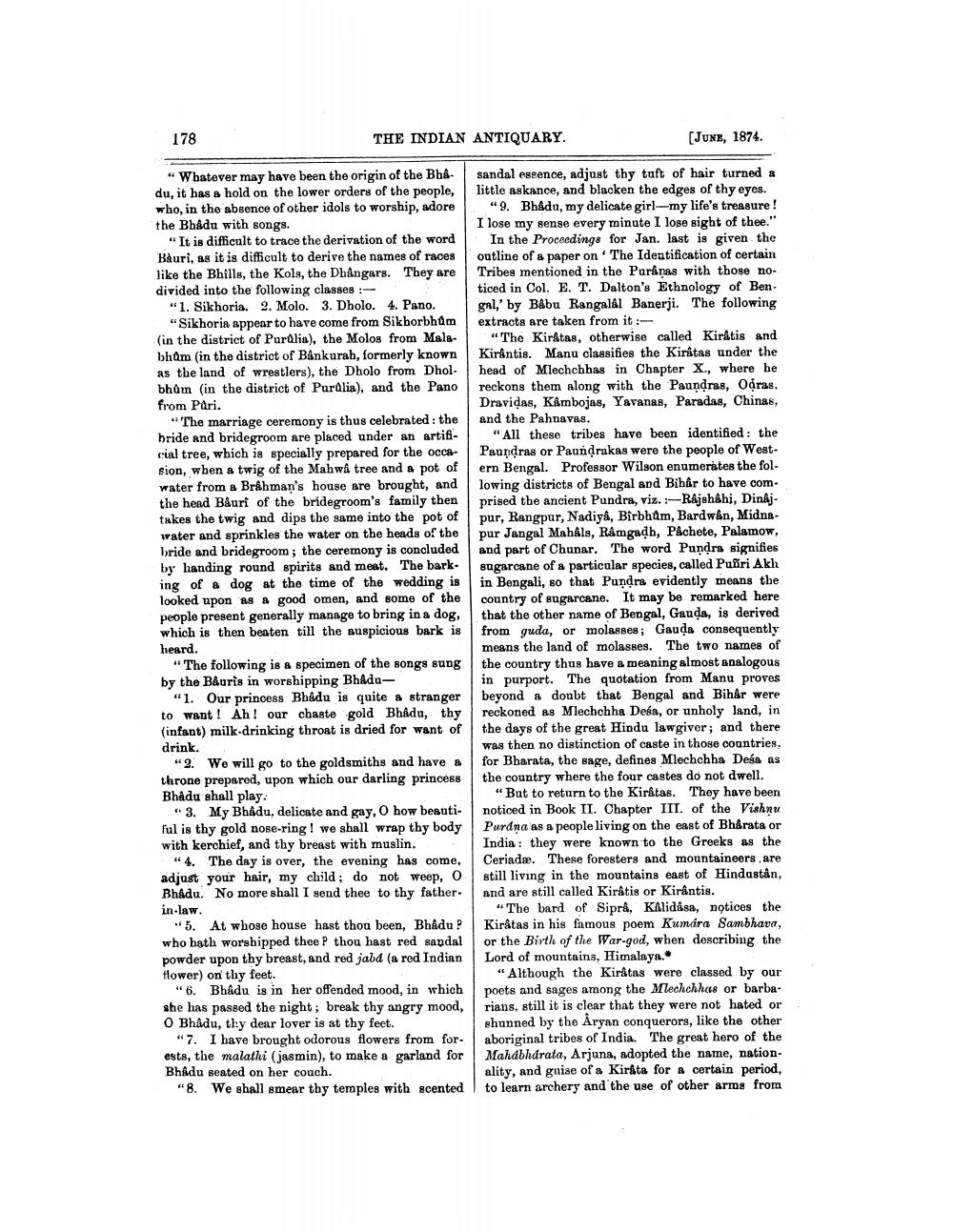________________
178
THE INDIAN ANTIQUARY.
[JUNE, 1874
“Whatever may have been the origin of the Bha- du, it has a hold on the lower orders of the people, who, in the absence of other idols to worship, adore the Bh&du with songs.
"It is difficult to trace the derivation of the word Bauri, as it is difficult to derive the names of races like the Bhills, the Kols, the Dhangars. They are divided into the following classes :
"1. Sikhoria. 2. Molo. 3. Dholo. 4. Pano.
"Sikhoria appear to have come from Sikborbham (in the district of Paralia), the Molos from Malsbham (in the district of Bankurah, formerly known as the land of wrestlers), the Dholo from Dhol. bhům (in the district of Purdlia), and the Pano from Pari.
“The marriage ceremony is thus celebrated: the bride and bridegroom are placed under an artificial tree, which is specially prepared for the occasion, when a twig of the Mahwa tree and a pot of water from a Brahman's house are brought, and the head Båurt of the bridegroom's family then takes the twig and dips the same into the pot of water and sprinkles the water on the heads of the bride and bridegroom; the ceremony is concluded by handing round spirits and meat. The bark. ing of a dog at the time of the wedding is looked upon as a good omen, and some of the people present generally manage to bring in a dog, which is then beaten till the auspicious bark is heard.
“The following is a specimen of the songs sung by the Bâuris in worshipping Bhåda
"1. Our princess Bhadu is quite a stranger to want! Ah! our chaste gold Bhadu, thy (infant) milk drinking throat is dried for want of drink.
"2. We will go to the goldsmiths and have a throne prepared, upon which our darling princess Bhâdu shall play:
"3. My Bhadu, delicate and gay, O how beautiful is thy gold nose-ring! we shall wrap thy body with kerchief, and thy breast with muslin.
"4. The day is over, the evening has come, adjust your hair, my child; do not weep, O Bhadu. No more shall I send thee to thy father. in-law.
5. At whose house hast thou been, Bhadu? who hath worshipped thee? thou hast red sandal powder upon thy breast, and red jabd (a red Indian flower) on' thy feet.
"6. Bhadu is in her offended mood, in which she has passed the night; break thy angry mood, O Bhadu, tly dear lover is at thy feet.
"7. I have brought odorous flowers from forests, the malathi (jasmin), to make a garland for Bhadu seated on her couch.
"8. We shall smear thy temples with scented
sandal eseence, adjust thy taft of hair turned a little askance, and blacken the edges of thy eyes.
"9. Bhadu, my delicate girl-my life's treasure ! I lose my sense every minute I lose sight of thee."
In the Proceedings for Jan. last is given the outline of a paper on The Identification of certain Tribes mentioned in the Paranas with those noticed in Col. E. T. Dalton's Ethnology of Ben. gal,' by Babu Rangalál Banerji. The following extracts are taken from it :
"The Kiratas, otherwise called Kirátis and Kirantis. Manu classifies the Kirktas under the head of Mlechchhas in Chapter X., where he reckons them along with the Paundras, Oras. Dravidas, Kambojas, Yavanas, Paradas, Chinas, and the Pahnavas.
"All these tribes have been identified: the Paundras or Paundrakas were the people of Western Bengal. Professor Wilson enumerates the fol. lowing districts of Bengal and Bihar to have com. prised the ancient Pundra, viz. :- Rajshahi, Dinajpur, Rangpur, Nadiya, Birbham, Bardwân, Midnapur Jangal Mahâls, Râmgadh, Pachete, Palamow, and part of Chunar. The word Pundra signifies sugarcane of a particular species, called Puñiri Akh in Bengali, so that Pundra evidently means the country of sugarcane. It may be remarked here that the other name of Bengal, Ganda, is derived from guda, or molasses; Gauda consequently means the land of molasses. The two names of the country thus have a meaning almost analogous in purport. The quotation from Manu proves beyond a doubt that Bengal and Bihar were reckoned as Mlechchha Desa, or unholy land, in the days of the great Hindu lawgiver; and there was then no distinction of caste in those countries, for Bharata, the sage, defines Mlechchha Desa as the country where the four castes do not dwell.
"But to return to the Kirktas. They have been noticed in Book II. Chapter III. of the Vishnu Purana as a people living on the east of Bhårata or India: they were known to the Greeks as the Ceriada. These foresters and mountaineers are still living in the mountains east of Hindastan, and are still called Kirátis or Kirântis.
"The bard of Sipra, Kalidasa, notices the Kiråtas in his famous poem Kumara Sambhava, or the Birth of the War-god, when describing the Lord of mountains, Himalaya.
"Although the Kiråtas were classed by our poets and sages among the Mlechchhas or barba. rians, still it is clear that they were not hated or shunned by the Aryan conquerors, like the other aboriginal tribes of India. The great hero of the Mahabharata, Arjuna, adopted the name, nationality, and guise of a Kirata for a certain period, to learn archery and the use of other arms from




